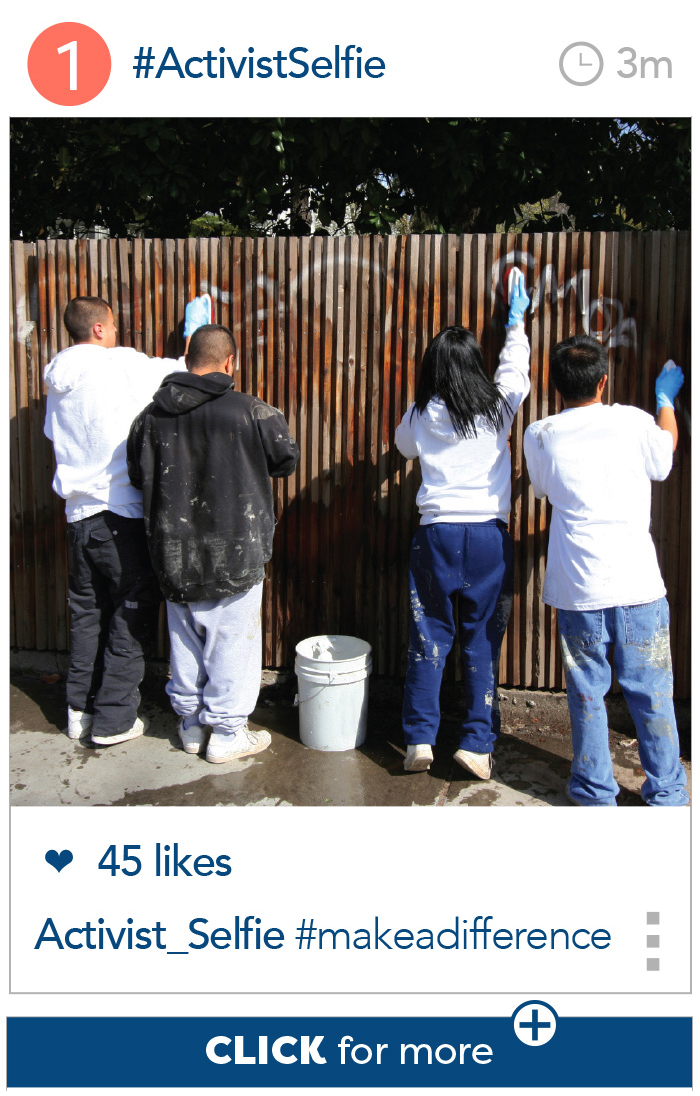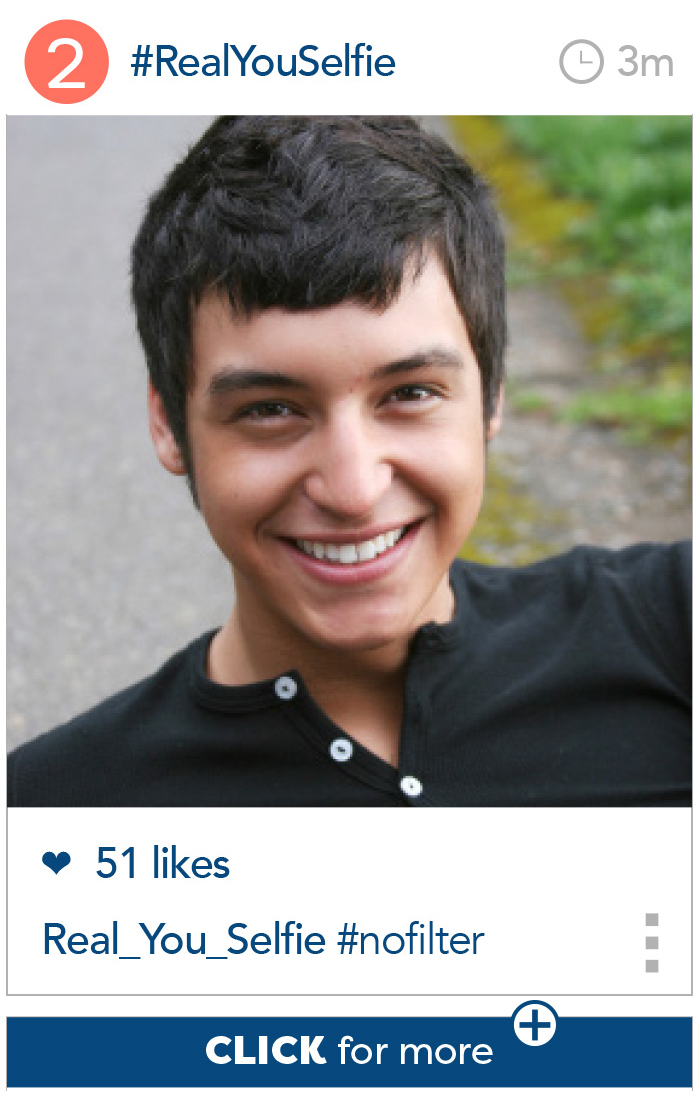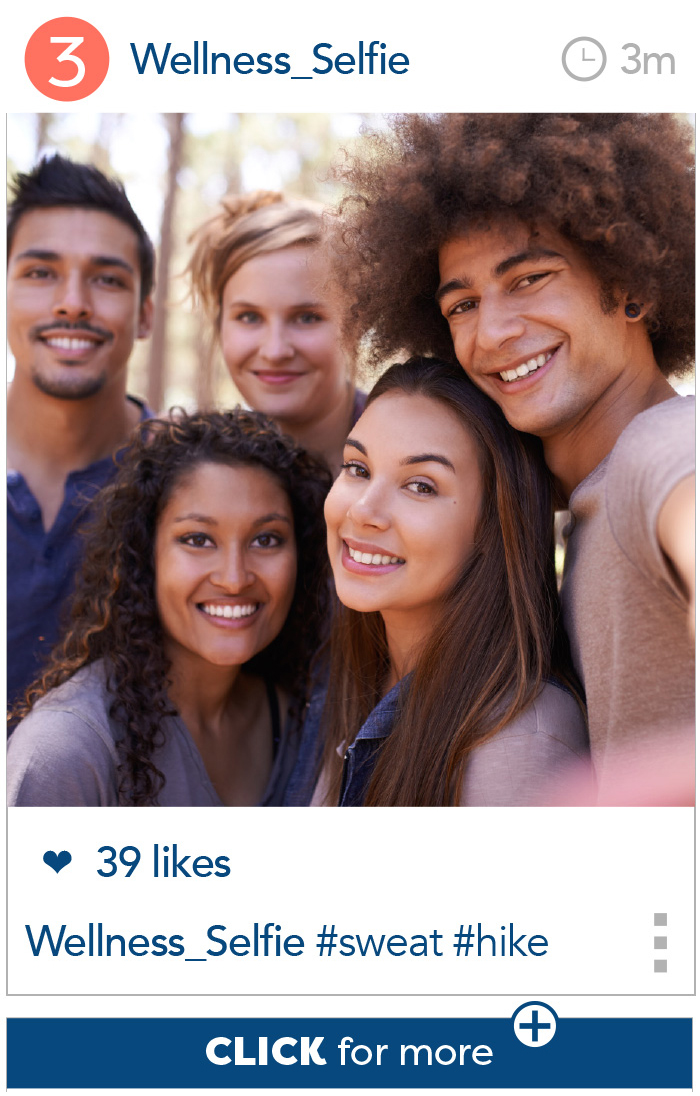Selfie revolution: Be a role model, not just a model
Rate this article and enter to win
Multiple-choice question: What are selfies for?
- Selfies promote community awareness.
- Selfies celebrate who we are.
- Selfies are for ignorant Instagrammers fishing for compliments.
All three answers came from undergraduates in a recent survey by Student Health 101. While they are not mutually exclusive—selfies can serve any or all of these purposes—it seems at times that the selfie phenomenon has divided us into devotees vs. haters.
#SelfieXpression
Selfies have given millennials a reputation for self-absorption. To revisionists, however, selfies are a valuable means of self-expression. “Selfies are the newest form of public performance,” says Dr. Daisy Pignetti of the Selfie Researchers Network and associate professor at the University of Wisconsin-Stout. “I think it’s clear that people want to show their true selves in photos. The selfie can be a way for them to reclaim that.” The selfie as a form of identity and a means of self-empowerment was a major theme in your responses to our survey. “A selfie is this generation’s way of celebrating who they are and what they look like,” says Jennifer G., a fifth-year undergraduate at Illinois State University. “We are told to hate ourselves, our bodies, our looks. Selfies celebrate all of this instead of expecting everyone to hide away in shame.”
This use of the selfie may be especially valuable for people of color, disabled people, and other marginalized communities.
#ThePersonalisPolitical
Selfies are increasingly used to influence public perceptions of stigmatized illnesses. In the #SemiColonProject416, participants “draw a semicolon on your wrist and post a photo of it, symbolizing that suffering from depression and suicidal thoughts/tendencies didn’t have to be the end of your story (life),” says Amanda W., a second-year student at Sussex County Community College, New Jersey.
#SelfieCitizenship
From there, it’s a short jump to promoting civic engagement and political issues. “I hashtag the cause for community awareness. Things that benefit the community require a collective mentality, so set examples! If it takes playing on ‘the narcissism of our generation,’ so be it!” says Leo S.*, a fifth-year undergraduate at Delaware State University.
“One of the current trends is taking selfies for transparency, especially for political reasons,” says Dr. Pignetti. Those causes and issues can be on any scale, from local to global. “I dressed up semi-formal to a breast cancer awareness event my sorority hosted on campus and invited people through my [selfie] post,” says Josie R., a fifth-year undergraduate at California State University, Fresno.
Selfies are also being used to build community resilience after disasters. “I took a selfie when walking the bridge to help my community try to overcome the church shooting in Charleston [in June, when nine people were killed]. A lot of people came out in support,” says Jasmine J., second-year undergraduate at Johnson & Wales University, Rhode Island.
Social connections are at least as important as material resources following shattering events, according to Daniel Aldritch, author of Building Resilience: Social Capital in Disaster Recovery (University of Chicago Press, 2012). Selfie activism could potentially strengthen communities. In Tunisia in 2014, people took pictures of themselves with piles of trash using #SelfiePoubella (trash selfie) to highlight the problem of street garbage, reportedly resulting in a government street cleanup. Researchers are exploring the use of selfies in political protests. “I posted a selfie in all-black attire to promote the 43 students who were kidnapped in Mexico,” says Eric R., a fourth-year undergraduate at Governors State University, Illinois.
“I feel the internet in general has offered people, young and old, more unique ways to get their voices heard,” says Dr. Pignetti. “Yes, people can post stupid things or bully others, but the positive impacts of the internet, I feel, far outweigh the negative.”

The activist selfie promotes community awareness and civic engagement.
Students’ stories
“I took a selfie of me wearing a shirt for suicide awareness. I wanted to get the message out that a walk was happening in the city, because a lot of people, especially of college age, don’t keep up with events.”
—McKenzie T., third-year undergraduate, Edgewood College, Wisconsin
“Social media has made the use of selfies for awareness a very real means for human rights activist communities. I have posted hashtagged selfies for awareness in support of justice in Syria and Venezuela.”
—Onyx B., second-year undergraduate, Colorado College
“I posted a selfie to try and get people to volunteer to help clean up the
town after it was hit by tornadoes.”
—Brandon B., second-year graduate student, Illinois State University

On Twitter and Instagram, check out #NaturalSelfie, #NoMakeupMonday, #TakeAnHonestSelfie, and #WokeUpLikeThis. What you’ll (mostly) see are pictures of people who aren’t afraid to post a less-than-perfect selfie.
The mainstream airbrushed-to-perfection media scene can erode our self-esteem and contribute to disordered eating behaviors, according to a 2008 analysis of 77 studies in Psychological Bulletin. Celebrities like Demi Lovato and Lena Dunham have pioneered the #NaturalSelfie resistance movement. It might lead you to higher selfie-satisfaction.
Students’ stories
“I hardly ever take selfies, but one that I did take was when women were taking pictures of themselves without any makeup on to show that we are all beautiful even without the masks. I feel so strongly that the media is crushing the identity of women and making [us] feel more inadequate than ever before.”
—Paige B., second-year undergraduate, University of Wyoming
“I participated in #20BeautifulWomen that was going around on Instagram.
I thought it was important for many women to understand that beauty isn’t just about what Hollywood perceives it as, but however one chooses to perceive it.”
—Carla F.*, second-year undergraduate, University of Memphis, Tennessee
(*Name changed for privacy.)

#HealthySelfie
At healthyselfies.org, users share pics and videos of themselves running 5Ks, eating fruits and veggies, and so on. “We started Healthy Selfies to have people share their photos and stories with others out there who can relate, be inspired, and stay motivated,” says Alexis Batausa, health and wellness promoter for the Mingo County Diabetes Coalition, West Virginia. Check out #HealthySelfie on Twitter and Instagram.
#SweatySelfie
Look no further for pictures of post-workout people. Scary chiseled abs? Hold tight to your self-esteem and move on by. Selfies of sweat-drenched T-shirts and matted hair can be used positively, to track your progress toward healthy, realistic fitness goals, and to encourage yourself and others.
Student’s story
“I posted a selfie of me after a workout drinking green juice and talked about self-awareness and health identity. I also did one saying that any progress deserves some recognition. It empowered me.”
—Jennifer G., fifth-year undergraduate, Illinois State University
#EmotionalHealthieSelfie
SH101 just invented this hashtag (you’re welcome). Here’s the idea:
Students’ stories
“I’ve used a selfie to share that I am doing better. When coming out of my depression, I felt the need to refresh my social media photos, so I took a selfie, and in it I smiled a genuine smile, which I hadn’t done in a long time. I was showing that I was getting better, and that others could get better too.”
—Sarah W., second-year undergraduate, Marlboro College, Vermont
“I am a person in long-term recovery from addiction. I belong to a couple of organizations dedicated to fun in recovery and spreading awareness [via selfies] that recovery works.”
—Seth W.*, third-year graduate student, Boise State University, Idaho
“I used a selfie to promote an event for petting dogs for exam stress relief.”
—Daniel L., second-year undergraduate, University of Waterloo, Ontario
(*Name changed for privacy.)
#PleaseNoSelfies
There are downsides, of course. Selfies may themselves represent peer pressure and conformity, as well as the increasingly public nature of our lives. And then there’s the regrettable subversion of the #PoliticalSelfie by local and national politicians. Unless the demise of social media occurs without warning, we must brace ourselves for endless #KissingBabies and #SelfiesInTheSenate.
Alexis Batausa, Health and Wellness Promoter, Mingo County Diabetes Coalition, West Virginia.
Daisy Pignetti, PhD, Associate Professor; Program Director, Professional Communication and Emerging Media Online Cachelor’s program, University of Wisconsin-Stout.
An open letter to all of my friends who take selfies. (2015, May 5). The Belle Jar. [Blog post]. Retrieved from https://bellejar.ca/2015/05/05/an-open-letter-to-all-my-friends-who-take-selfies/
Fox, J., & Rooney, M. C. (2015). The Dark Triad and trait self-objectification as predictors of men’s use and self-presentation behaviors on social networking sites. Personality and Individual Differences, 76, 161-165.
Grabe, S., Ward, L. M., & Hyde, J. S. (2008). The role of the media in body image concerns among women: A meta-analysis of experimental and correlational studies. Psychological Bulletin, 134(3), 460–476.
HealthySelfies. (n.d.). [Website]. Retrieved from healthyselfies.org
Kuntsman, A. (2015). Acts of selfie citizenship. Manchester Metropolitan University. [Video]. Retrieved from https://mmutube.mmu.ac.uk/media/Adi+Kuntsman/1_5n1o3xdd
McFadden, S. (2015, February 24). Selfies allow black women to say we are here and we are beautiful. The Guardian. Retrieved from https://www.theguardian.com/commentisfree/2015/feb/24/selfies-black-women-we-are-here-we-are-beautiful
Sampson, R. (2013, May 17). When disaster strikes, it’s survival of the sociable. New Scientist, 2916. Retrieved from https://scholar.harvard.edu/files/sampson/files/when_disaster_strikes.pdf
Shape Up Houston. (n.d.). My healthy selfies. Retrieved from https://www.shapeuphouston.org/Portals/shapeuphouston/Healthy%20Selfie.pdf
Stein, R. L., Kuntsman, A., & Mottarhedeh, N. (2015). The political consciousness of the selfie. Stanford University Press blog. Retrieved from https://stanfordpress.typepad.com/blog/2015/07/the-political-consciousness-of-the-selfie.html
Van Vonderen, K.E., & Kinnally, W. (2012). Media effects on body image: Examining media exposure in the broader context of internal and other social factors. American Communication Journal, 14(2).


